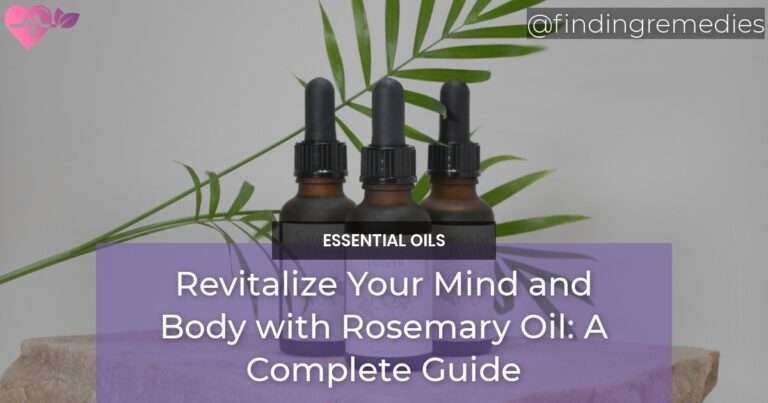Rosemary oil is an incredibly powerful tool for revitalizing both your mind and body. The list of benefits that this amazing essential oil can provide is seemingly endless, and with the right application, you can take full advantage of its therapeutic effects.
In this complete guide, we will explore everything you need to know about rosemary oil: from its healing properties to the best ways to use it for maximum benefit. We’ll also discuss why it’s important to take the time to nurture your mind and body and how rosemary oil can help you do just that. Whether you’re looking to reduce stress and anxiety, boost your mood, or simply feel more energized, rosemary oil offers a wealth of therapeutic benefits that can help you achieve your goals. So read on and learn how you can use this incredible essential oil to revitalize your mind and body.
Table of Contents
Understanding Rosemary Oil
Rosemary oil is a highly versatile essential oil extracted from the leaves of the rosemary plant. The oil contains a range of chemical compounds that have been found to offer numerous health benefits. It has a distinctive woody aroma that is widely used in aromatherapy and culinary practices.
Chemical Composition of Rosemary Oil
Rosemary oil is rich in a variety of chemical compounds that contribute to its therapeutic properties. Some of the primary compounds include:
- Camphor
- 1,8-Cineole
- α-Pinene
- β-Pinene
- Camphene
- Verbenone
- Limonene
These compounds are known to possess antifungal, antibacterial, analgesic, and anti-inflammatory properties, among others.
Extraction Process of Rosemary Oil
There are several methods used to extract rosemary oil, including steam distillation, solvent extraction, and CO2 extraction. Steam distillation is the most common method used and involves distilling the leaves and flowers of the rosemary plant with steam. The quality of the oil extracted can be affected by factors such as the age of the plant, growing conditions, and extraction method used.
Health Benefits of Rosemary Oil
Rosemary oil has numerous health benefits that make it a popular choice in traditional medicine and aromatherapy. Some of the primary benefits of rosemary oil include:
Physical Health Benefits of Rosemary Oil
- Relieves pain and inflammation
- Reduces the severity of asthma attacks
- Improves digestion and relieves constipation
- Boosts the immune system
- Regulates blood sugar levels
- Improves circulation
- Promotes healthy hair growth
- Reduces the appearance of wrinkles and fine lines
- Improves skin hydration and elasticity
Psychological and Emotional Benefits of Rosemary Oil
- Relieves stress and anxiety
- Enhances cognitive function and memory retention
- Improves mood and promotes relaxation
Uses of Rosemary Oil
Rosemary oil has a wide range of uses in various industries, including culinary, medicinal, and aromatherapy. Some of the primary uses of rosemary oil include:
Culinary Uses of Rosemary Oil
- Flavoring for various dishes
- Preservative for food products
Medicinal Uses of Rosemary Oil
- Treatment for respiratory conditions
- Treatment for digestive issues
- Treatment for joint pain and arthritis
- Treatment for menstrual cramps and PMS symptoms
Aromatherapy Uses of Rosemary Oil
- Relieves stress and anxiety
- Improves cognitive function and memory retention
- Promotes relaxation and restful sleep
- Provides relief from headaches and migraines
- Reduces inflammation and pain
Safety and Risks Associated with Rosemary Oil
Rosemary oil is generally safe for use when used properly, but there are some precautions to be aware of. Some of the potential risks associated with rosemary oil include:
- May cause skin irritation in some individuals
- May cause allergic reactions in some individuals
- May cause seizures in individuals with epilepsy
- Should not be used during pregnancy or while breastfeeding
How to Use Rosemary Oil
There are several methods of applying rosemary oil, including:
- massage: Mix 2-3 drops of rosemary oil with a carrier oil and massage onto the skin.
- Inhalation: Add 2-3 drops of rosemary oil to a diffuser or inhale directly from the bottle.
- Bath: Add 5-6 drops of rosemary oil to a warm bath and soak for 20-30 minutes.
When using rosemary oil, it is important to dilute it properly to avoid skin irritation or other adverse effects. For general use, a dilution ratio of 2-3% is recommended.
Conclusion
Rosemary oil is a highly versatile essential oil that offers numerous health benefits. Its unique chemical composition, extraction process, and wide range of uses make it a popular choice in traditional medicine, culinary practices, and aromatherapy. With proper use and precautions, rosemary oil can be a valuable addition to your health and wellness routine.

